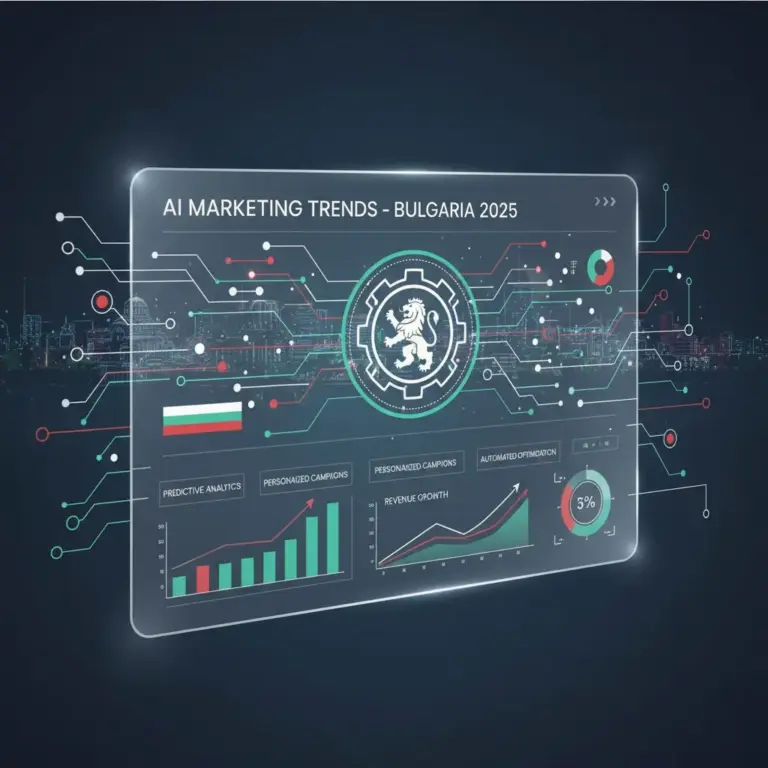Top SEO Trends 2025: What Marketers Need to Know Now
The digital marketing landscape is experiencing its most dramatic transformation yet. With Top SEO Trends 2025, artificial intelligence, shifts in user behavior, and technological advances are reshaping how businesses connect with their audiences online. For marketers in Bulgaria and worldwide, staying ahead of these SEO trends isn’t just advantageous—it’s essential for survival in an increasingly competitive digital ecosystem.
The convergence of AI technology and search optimization has created unprecedented opportunities for businesses willing to adapt. From voice search evolution to predictive analytics, the SEO strategies that worked yesterday are becoming obsolete at lightning speed. Companies that recognize and implement these emerging trends now will dominate their markets while others struggle to keep up.
The AI Revolution in Search Optimization
Artificial intelligence has fundamentally altered how search engines understand and rank content. Google’s advanced AI algorithms now process queries with human-like comprehension, analyzing context, intent, and semantic relationships rather than simply matching keywords. This shift demands a complete rethinking of traditional SEO approaches.
Modern AI systems evaluate content quality through sophisticated natural language processing, measuring factors like readability, expertise demonstration, and user engagement patterns. Search engines can now distinguish between genuinely valuable content and keyword-stuffed articles, rewarding authentic expertise while penalizing manipulative tactics.
The implications extend far beyond content creation. AI-powered search engines predict user needs before they’re explicitly stated, personalizing results based on individual behavior patterns, location data, and contextual signals. This predictive capability means marketers must focus on comprehensive user journey optimization rather than isolated keyword targeting.
Machine learning algorithms continuously evolve their understanding of search intent, making real-time adjustments based on user satisfaction signals. Websites that provide immediate value and seamless user experiences are increasingly favored, while those that fail to meet evolving expectations face declining visibility.
Voice Search Optimization: The Conversational Web
Voice search adoption has reached a tipping point, fundamentally changing how people interact with search technology. Users now speak to their devices in natural, conversational language, expecting immediate, precise answers to complex queries. This shift requires marketers to optimize for longer, question-based keywords and featured snippet positioning.
The rise of smart speakers and voice assistants has created new opportunities for local businesses. Voice searches often include location-specific intent, making local SEO optimization more critical than ever. Businesses must ensure their Google Business profiles are comprehensive, accurate, and optimized for voice query patterns.
Conversational search queries typically begin with interrogative words like “how,” “what,” “where,” and “why.” Content strategies must address these question formats directly, providing clear, concise answers that voice assistants can easily extract and relay to users. This approach requires restructuring content architecture around user questions rather than traditional keyword clusters.
Voice search results heavily favor websites with strong technical foundations, including fast loading speeds, mobile optimization, and structured data implementation. Search engines prioritize sources they can quickly access and confidently recommend for voice responses.
Mobile-First Indexing: Beyond Responsive Design
Mobile-first indexing has evolved beyond simple responsive design requirements. Search engines now prioritize websites that deliver exceptional mobile experiences, evaluating factors like touch-friendly navigation, optimized images, and accelerated loading speeds across various devices and connection qualities.
Progressive Web Applications (PWAs) are gaining significant SEO advantages, combining the best aspects of websites and mobile apps. These technologies provide offline functionality, push notifications, and app-like experiences while maintaining search engine accessibility. Early adopters of PWA technology are seeing substantial improvements in user engagement and search rankings.
Mobile page speed has become a critical ranking factor, with search engines setting increasingly strict performance standards. Websites that load within two seconds receive preference, while slower sites face significant visibility penalties. This requirement has sparked innovation in image compression, code optimization, and content delivery network utilization.
The mobile user experience extends beyond technical performance to include intuitive navigation, readable typography, and accessible design elements. Search engines evaluate how effectively users can accomplish their goals on mobile devices, rewarding sites that eliminate friction and frustration.
Ready to dominate your market with advanced SEO strategies? Contact AI Marketing BG today for a comprehensive SEO audit and discover how our proven methodologies can transform your online visibility.
Core SEO Trends Transforming Digital Marketing
The following developments are reshaping SEO strategies across industries:
• Entity-Based SEO: Search engines now understand entities (people, places, concepts) rather than just keywords, requiring content that establishes apparent topical authority and entity relationships through comprehensive coverage and expert insights.
• Experience-First Rankings: User experience signals, including page load speed, interactivity, visual stability, and engagement metrics, directly influence search rankings, making technical optimization inseparable from content strategy.
• Predictive Search Intelligence: AI algorithms anticipate user needs based on search history, seasonal patterns, and trending topics, enabling proactive content creation that captures emerging demand before competitors.
• Multi-Modal Search Integration: Visual and voice search capabilities require optimization across text, images, videos, and audio content, demanding diverse content formats and comprehensive metadata strategies.
• Personalization at Scale: Search results increasingly reflect individual user preferences, location, and behavior patterns, requiring flexible content strategies that appeal to diverse audience segments.
• Sustainability and Social Responsibility: Search engines favor businesses demonstrating environmental consciousness and social impact, making corporate responsibility a ranking factor for forward-thinking companies.
• Real-Time Content Freshness: Dynamic content updates, live information, and timely responses to trending topics receive priority ranking, emphasizing the importance of agile content management systems.
Local SEO Evolution: Hyperlocal Targeting
Local search optimization has evolved into hyperlocal targeting, where businesses must optimize for specific neighborhoods, districts, and micro-locations. This granular approach requires comprehensive local keyword research, community-specific content creation, and deep integration with local business ecosystems.
Google Business Profile optimization now extends beyond basic information to include regular posts, customer interaction, review management, and local event participation. Businesses that actively engage with their local communities through digital platforms receive substantial ranking benefits.
Local content marketing has become essential for establishing geographic relevance. Businesses must create content addressing local events, regulations, cultural nuances, and regional preferences. This approach particularly benefits service-based businesses in markets like Bulgaria, where local expertise and cultural understanding drive customer trust.
Hyperlocal SEO also encompasses local link building, requiring partnerships with local organizations, sponsorships of community events, and collaboration with other regional businesses. These authentic local connections signal geographic relevance to search engines while building genuine community relationships.
Technical SEO: The Foundation of Success
Technical SEO has evolved into a complex discipline requiring expertise in web development, server management, and user experience design. Core Web Vitals remain fundamental ranking factors, but search engines now evaluate additional technical elements, including security protocols, accessibility features, and cross-device compatibility.
Structured data implementation has become more sophisticated, with search engines supporting increasingly complex markup schemas. Businesses that properly implement structured data see enhanced search result appearances, including rich snippets, knowledge panels, and specialized result features.
Website security has transitioned from best practice to a ranking requirement. HTTPS implementation, regular security audits, and proactive vulnerability management are essential for maintaining search visibility. Search engines actively penalize websites with security issues, making cybersecurity inseparable from SEO success.
Page speed optimization requires comprehensive technical strategies, including image optimization, code minification, browser caching, and content delivery network implementation. The most successful websites achieve loading speeds under one second through advanced technical optimization techniques.
Top SEO Trends 2025: Transforming Digital Marketing
Content marketing has shifted dramatically toward quality over quantity, with search engines favoring comprehensive, authoritative content over frequent, shallow publications. This evolution rewards businesses that invest in expert content creation, original research, and detailed topic exploration.
Topic clustering has replaced traditional keyword targeting, requiring content strategies organized around comprehensive subject coverage. Businesses must demonstrate expertise across entire topic areas rather than targeting isolated keywords, creating interconnected content ecosystems that establish topical authority.
User-generated content and community engagement signals have gained significant ranking influence. Businesses that foster active user communities, encourage customer reviews, and facilitate meaningful discussions receive substantial SEO benefits beyond traditional content creation efforts.
Content personalization technologies enable dynamic content adaptation based on user characteristics, search history, and behavioral patterns. This approach requires sophisticated content management systems capable of delivering tailored experiences while maintaining search engine accessibility.
AI Marketing BG: Your Strategic SEO Partner
At AI Marketing BG, we combine 25+ years of IT security expertise with cutting-edge SEO strategies to deliver exceptional results for businesses across Bulgaria. Our comprehensive approach integrates AI-powered optimization techniques with proven traditional methods, ensuring your website achieves and maintains top search rankings.
Our team understands the unique challenges facing Bulgarian businesses in the digital marketplace. We provide localized SEO strategies that resonate with Bulgarian audiences while competing effectively in international markets. From restaurants in Varna to law firms in Sofia, our clients consistently achieve 95% satisfaction rates and 60% cost reductions through our expert optimization services.
Our Azure-powered infrastructure ensures your website maintains optimal performance while our military-grade security protocols protect your digital assets. We implement the latest SEO trends while maintaining the technical foundation necessary for long-term success. Our clients benefit from continuous optimization, detailed analytics reporting, and proactive strategy adjustments that keep them ahead of algorithm changes.
Preparing for SEO Success in 2025
The businesses that thrive in 2025 will be those that embrace change while maintaining focus on fundamental user needs. SEO success requires balancing cutting-edge technology adoption with timeless principles of valuable content creation and authentic user experience design.
Investment in comprehensive SEO strategies yields compound returns over time. Businesses that implement these emerging trends now will build sustainable competitive advantages that become increasingly difficult for competitors to overcome. The key lies in understanding that SEO is no longer a standalone marketing tactic but an integral component of overall business strategy.
Success demands continuous learning, adaptation, and strategic thinking. The SEO landscape will continue evolving rapidly, but businesses that establish strong foundations while remaining agile can navigate any changes successfully.







